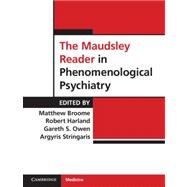
What is included with this book?
| Prologue | |
| How to read this book | |
| Acknowledgements | |
| Intellectual Background | |
| Introduction | |
| Influences on Phenomenology | |
| Franz Brentano (1838-1917): Brentano, F. (1887), 'The Concept of a Descriptive Psychology'; Brentano, F. (1874), 'The Distinction between Mental and Physical Phenomena' | |
| Wilhelm Dilthey (1833-1911): Dilthey, W. (1894), 'Ideas about a Descriptive and Analytical Psychology' | |
| Max Weber (1864-1920): Weber, M. (1949), 'Objectivity' in Social Science and Social Policy' | |
| Henri Bergson (1859-1941): Bergson, H. (1910), Selections from 'Time and Free Will: An Essay on the Immediate Data of Consciousness' | |
| Phenomenological Philosophy | |
| Edmund Husserl (1859-1938): Husserl, E. (1919), 'Ideas 1'; Husserl, E. (1948), Selections from 'Experience and Judgment' | |
| Max Scheler (1874-1928): Scheler, M. (1913-14) 'Phenomenology and the Theory of Cognition'; Scheler, M. (1928), Selections from 'Man's Place in Nature'; Scheler, M. (1913-16), 'Feeling and Feeling States'; Scheler, M. (1922), Selections from 'The Nature of Sympathy'; Scheler, M. (1914), 'On the Idea of Man'; Scheler, M. (1928), Selections from 'The Human Place in the Cosmos' | |
| Martin Heidegger (1889-1976): Heidegger, M. (1919), 'The Idea of Philosophy and the Problem of Worldview,' War Emergency Semester; Heidegger, M. (1994), Selections from 'Introduction to Phenomenological Research'; Heidegger, M. (1927), 'The Worldhood of the World'; Heidegger, M. (1927), 'Fear as a Mode of State-of-Mind' | |
| The Phenomenological Approach in Psychiatry | |
| Introduction | |
| Jaspers' approach 1: static understanding - 'phenomenology': Jaspers, K. (1912), 'The Phenomenological Approach in Psychopathology' | |
| Jaspers' approach 2: genetic understanding - 'Verstehen': Jaspers, K. (1959), 'Meaningful psychic connections' | |
| Minkowski's structural approach: Minkowski, E. (1933), 'The Notion of a Generating Disorder and the Structural Analysis of Mental Disorders' | |
| Binswanger's existential approach: Binswanger, L. (1946), 'The Existential Analysis School of Thought' | |
| Phenomenologies of Mental Disorder | |
| Introduction | |
| Brain injury: Goldstein, K. (1940), 'Pathology and the Nature of Man: The Abstract Attitude in Patients with Lesions of the Brain Cortex' | |
| Schizophrenia: Jaspers, K. (1959), 'The Worlds of Schizophrenic Patients'; Minkowski, E. (1927), 'The Essential Disorder Underlying Schizophrenia and Schizophrenic Thought'; Binswanger, L. (1956), 'Extravagance, Perverseness, Manneristic Behaviour and Schizophrenia'; Blankenburg, W. (1968), 'First Steps Toward a Psychopathology of 'Common Sense''; Blankenburg, W. (1965), 'On the Differential Phenomenology of Delusional Perception: A Study of an Abnormal Significant Experience'; Conrad, K. (1958), 'Beginning Schizophrenia: Attempt for a Gestalt-Analysis of Delusion'; Rümke, H. (1948), 'The Nuclear Symptom of Schizophrenia and the Praecox Feeling' | |
| Affective disorder: Binswanger, L. (1964), 'On the Manic Mode of Being-in-the-World'; Schneider, K. (1920), 'The Stratification of Emotional Life and the Structure of States of Depression'; Straus, E. (1928), 'The Experience of Time in Endogenous Depression and in the Psychopathic Depressive State'; von Gebstattel, V. (1928), 'Compulsive Thought Relating to Time in Melancholia'; Tellenbach, H. (1982), 'Melancholy as Endocosmogenic Psychosis' | |
| Obsessive compulsive disorder: Straus, E. (1938), 'The Pathology of Compulsion'; von Gebsattel, V. (1938), 'The World of the Compulsive' | |
| Other: Scheler, M. (1913), 'The Psychology of So-called Compensation Hysteria and the Real Battle against Illness'; von Gebsattel, V. (1963), 'The Meaning of Medical Practice'; Merleau-Ponty, M. (1945), 'Cézanne's Doubt'; Epilogue | |
| Index | |
| Table of Contents provided by Publisher. All Rights Reserved. |
The New copy of this book will include any supplemental materials advertised. Please check the title of the book to determine if it should include any access cards, study guides, lab manuals, CDs, etc.
The Used, Rental and eBook copies of this book are not guaranteed to include any supplemental materials. Typically, only the book itself is included. This is true even if the title states it includes any access cards, study guides, lab manuals, CDs, etc.